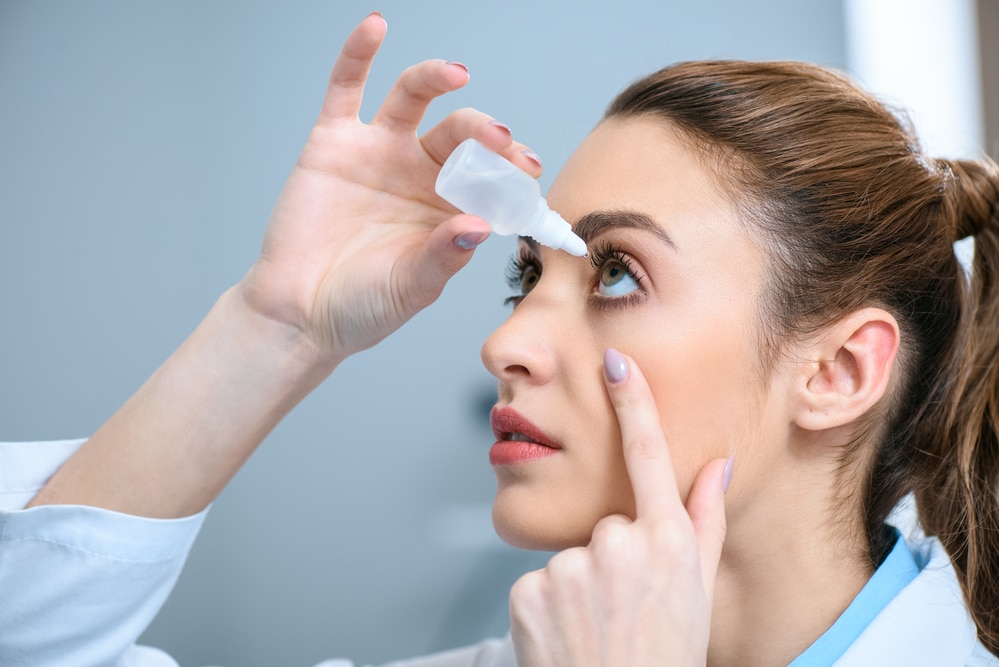
As the leaves start to change color and the air grows colder, you know winter is coming. With all of these transitions and the holidays ahead, it is easy to forget to take special care of your eyes. In fact, there are some things you can do to maintain better eye health throughout wintertime and into spring. We review some of these great winter eye care tips, below.
Common Winter Conditions Affect Your Eyes
It is easy to keep your eyes looking, feeling and seeing their best year round, even with some of the drastic environmental conditions of winter. But to understand how to exercise good winter eye care, it is important to first consider problems common to this time of year.
Dry Eyes
The colder temperatures mean less moisture in the air. At the same time, you likely turn the heat up on your thermostat to stay comfortable in your home, office and car. As a result of these conditions where lower moisture meets heat, your eyes dehydrate. They become dry, red, painful and itchy. You can also experience swelling and blurry vision.
Teary Eyes
It may sound odd that your eyes can produce more water in the winter yet they still dehydrate. Because of cold winds and dropping temperatures, your eyes become irritated. In an effort to protect these organs and your vision, your body starts over-producing tears. This most often occurs when you spend time outdoors in cold, windy conditions. With the increased tears, your vision blurs.
Tired Eyes
The winter has fewer hours of daylight. These darker conditions make driving, reading and other activities more strenuous for the eyes as they work to focus in lower light. The result is eye strain. You can avoid eye exhaustion and strain by ensuring you use more artificial light in winter, particularly when reading or working.
Digital Eye Strain
During wintry days and nights it is easy to spend more time indoors using digital devices. But extended use of these devices like your smartphone, tablet, television and computer can cause headaches, eye strain and dry eye.
Contact Lens Effects
Wearing contacts in sometimes less comfortable in winter. This is particularly true when you face harsh winds, freezing temps and lower humidity these colder months bring. As a result, you may have eye irritation.
Winter Eye Care Tips for Healthier Eyes
Now that we have explored the basics of how winter affects your eyes, let’s look at the best winter eye care tips.
Stay Hydrated
It is always important to drink enough water to stay hydrated. But the hot beverages we drink more of in wintertime can make dehydration worse. This makes it particularly important to drink plenty of fresh water to keep our bodies in balance. Adequate hydration also keeps your eyes hydrated as part of basic winter eye care.
Maintain a Healthy Diet
Just like staying hydrated, eating a well-balanced diet is important every day of the year. But this is also an important winter eye care tip because specific foods help your eyes stay healthier and see better. Such is the case with green leafy vegetables, carrots and other fresh produce.
Regulate Your Heater
Use It can feel tempting to crank up the heat in your home, office and car. But heating dries and irritates your eyes, particularly because winter air already holds so little moisture. To stay warm while maintaining a healthier environmental balance for your eyes, use a humidifier in your home. Also try to regulate your heater use at lower temperatures. When in the car, a good winter eye care tip is avoiding blowing the heater directly in your eyes. Turn the vents away from your face to keep the cabin warm without drying out your eyes.
Wash Your Hands
If you have the flu, a cold or any respiratory infection, it is important to avoid touching your eyes. Also ensure you wash your hands often, particularly after blowing your nose, coughing or sneezing. The germs associated with these illnesses of winter can affect your eyes, too. As a result, you can experience pain and irritation. Washing your hands often is one of the best winter eye care tips, especially when you are sick.
Use Eye Drops
Lubricating eye drops work particularly well if you are going to spend time outdoors in the winter. At the same time, you can use these drops inside where your heater and low humidity affect your eyes. Before following through on this winter eye care tip, ask your eye doctor for a recommendation for the best lubricating eye drops. Some over-the-counter brands can actually lead to eye dryness with prolonged use.
Wear Your Glasses
If you wear contact lenses, give your eyes a break and wear your glasses during the winter. Glasses provide a barrier against winter wind and cold. Wearing them can also relieve dryness irritated by contact lens wear in wintry conditions. If you will be spending time outdoors in snowy conditions, it is important to wear UV protective sunglasses. These shades can prevent sunburn of the eye caused by the sun reflecting off of the snow’s surface. Eye sunburn is called photokeratitis.
Visit Your Eye Doctor for Winter Eye Care and More Tips
Of course, it is important to maintain good eye health throughout each year. But in winter, your eyes may feel more tired, irritated, dry, strained or swollen that during warmer months. It is a good time to visit your eye doctor at Clarity Vision for an eye exam and advice to relieve common winter eye conditions.
Clarity Vision has multiple locations in Southeastern Virginia and North Carolina. These locations include:
Schedule your next eye exam at your nearest Clarity Vision Eye Care Center today.
















